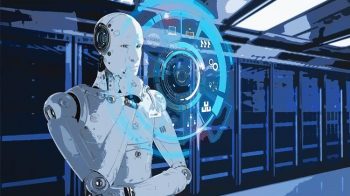
DataRobot, the leader in automated machine learning, announced that its customers have built one billion models on its Amazon Web Services (AWS) cloud platform — a major milestone in AI adoption.
DataRobot customers from around the world are using these machine learning models to better understand and glean actionable insights from accessible data.
Leveraging the scalability of AWS and the processing power of Intel® Xeon® processors, the DataRobot Cloud platform automates the data science workflow, enabling automation-first data scientists and citizen data scientists to build and deploy the most accurate predictive models in minutes. With the intelligence afforded by the DataRobot platform, organizations make informed decisions to improve productivity and efficiency, support business objectives, and increase revenue.
“As a compute-intensive application, our cloud environment provides organizations with a flexible and scalable way to build the machine learning models required to improve business processes and impact business results,” said Phil Gurbacki, VP of Product Management, DataRobot. “Our customers build more than two and a half million models every day, and with each model, our solution gets smarter and more sophisticated. Having now learned from a billion models, DataRobot is putting the power of machine learning into the hands of users across a growing number of use cases, delivering real value to organizations across the globe.”
The DataRobot platform hosts models that serve organizations from a range of industries, including healthcare, banking, manufacturing, retail, and information technology. The models determine, for instance, if a customer is going to churn; if a patient will be readmitted to a hospital; if an insurance candidate is likely to default on a loan; and even when a movie script is poised to become a success. DataRobot enables organizations to build trustworthy AI, providing human-friendly explanations for how the AI is trained, what patterns the AI finds in the data, and even the reasons the AI makes decisions. DataRobot’s industry-leading automation reduces human error via built-in guardrails to ensure best practices are followed, as well as automated model training and deployment.
DataRobot’s one billion models milestone comes on the heels of a year marked by explosive growth, including raising $100 million in Series D financing from top investors to support continued global expansion and further platform development. The company also more than doubled its customer base, adding new clients including New York Life, Humana, and BASF to its roster of Fortune 500 companies, nonprofit organizations, and academic institutions spread across 35 countries.
To meet the growing demand for its automated machine learning solution, DataRobot also made several strategic acquisitions to enhance its capabilities — in February 2019, the company acquired data collaboration platform provider Cursor to bolster its data management abilities, and in July 2018, DataRobot acquired Nexosis to further the company’s quest to democratize data science enabling the AI-driven enterprise. DataRobot also increased its employee count by more than 90 percent, bringing total employees to more than 600 across its offices in North America, Europe, Australia, Asia, and South America.
 (0)
(0) (0)
(0)Archive
- October 2024(44)
- September 2024(94)
- August 2024(100)
- July 2024(99)
- June 2024(126)
- May 2024(155)
- April 2024(123)
- March 2024(112)
- February 2024(109)
- January 2024(95)
- December 2023(56)
- November 2023(86)
- October 2023(97)
- September 2023(89)
- August 2023(101)
- July 2023(104)
- June 2023(113)
- May 2023(103)
- April 2023(93)
- March 2023(129)
- February 2023(77)
- January 2023(91)
- December 2022(90)
- November 2022(125)
- October 2022(117)
- September 2022(137)
- August 2022(119)
- July 2022(99)
- June 2022(128)
- May 2022(112)
- April 2022(108)
- March 2022(121)
- February 2022(93)
- January 2022(110)
- December 2021(92)
- November 2021(107)
- October 2021(101)
- September 2021(81)
- August 2021(74)
- July 2021(78)
- June 2021(92)
- May 2021(67)
- April 2021(79)
- March 2021(79)
- February 2021(58)
- January 2021(55)
- December 2020(56)
- November 2020(59)
- October 2020(78)
- September 2020(72)
- August 2020(64)
- July 2020(71)
- June 2020(74)
- May 2020(50)
- April 2020(71)
- March 2020(71)
- February 2020(58)
- January 2020(62)
- December 2019(57)
- November 2019(64)
- October 2019(25)
- September 2019(24)
- August 2019(14)
- July 2019(23)
- June 2019(54)
- May 2019(82)
- April 2019(76)
- March 2019(71)
- February 2019(67)
- January 2019(75)
- December 2018(44)
- November 2018(47)
- October 2018(74)
- September 2018(54)
- August 2018(61)
- July 2018(72)
- June 2018(62)
- May 2018(62)
- April 2018(73)
- March 2018(76)
- February 2018(8)
- January 2018(7)
- December 2017(6)
- November 2017(8)
- October 2017(3)
- September 2017(4)
- August 2017(4)
- July 2017(2)
- June 2017(5)
- May 2017(6)
- April 2017(11)
- March 2017(8)
- February 2017(16)
- January 2017(10)
- December 2016(12)
- November 2016(20)
- October 2016(7)
- September 2016(102)
- August 2016(168)
- July 2016(141)
- June 2016(149)
- May 2016(117)
- April 2016(59)
- March 2016(85)
- February 2016(153)
- December 2015(150)
